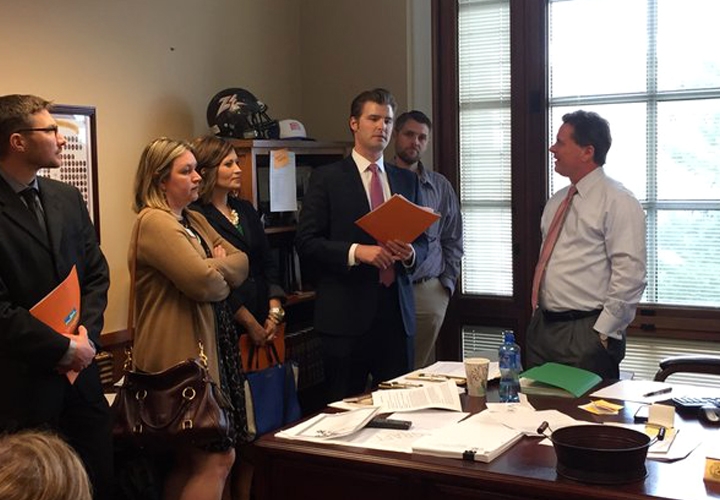What’s the Chamber doing for you in Jefferson City?

The 2016 Missouri legislative session ends May 13, and the Chamber has worked since January to advocate for the priorities of business: testifying on legislation, speaking one-on-one with legislators, and leading stakeholder visits, just to name a few.
It’s vital that elected officials consider business needs in the lawmaking process. We also know you’re busy growing jobs, managing payroll and hiring workers. That’s why we maintain a staff presence in the Capitol every week of the state legislative session. That way, you can focus on your business while we advocate on issues like transportation, regulation and workers’ compensation.
The Network visits the Capitol
Following a successful advocacy day with transportation stakeholders in March, 20 members of The Network traveled to Jefferson City April 6 to represent the interests of Springfield’s young professionals.
Led by Network Chairman Marshall Kinne, Med-Pay, the delegation was introduced as special guests on the House floor by Rep. Lincoln Hough. The group met with numerous leaders, including Speaker of the House Todd Richardson, Assistant Majority Floor Leader Rep. Kevin Austin and Chris Pieper, chief of staff for Gov. Jay Nixon.
Those on the trip discussed business priorities, including transportation funding, workforce development and investment in early childhood education. The trip was considered a big success, both for those that attended and the legislators with whom they spoke.
Springfield Metro Partnership dines with decision makers
On April 20, the Springfield Metro Partnership hosted its final breakfast of the session. Local legislators and other lawmakers attended, along with more than 50 people from all 10 Partnership organizations who traveled to Jefferson City to advocate on behalf of the southwest Missouri region.
Top priorities for the Springfield Metro Partnership for 2016 include:
- Workforce development – The partnership encourages innovative solutions and flexible implementation of Missouri’s workforce development programs to match current and future employer needs.
- Transportation infrastructure – Lawmakers are encouraged to find alternative sources of funding for transportation infrastructure to ensure continued investment in the statewide system.
- Education investment – The partnership supports funding education at levels comparable to surrounding states in order to remain competitive; this includes investing in early childhood education, higher education, libraries and continuing education opportunities based on public return on investment.

